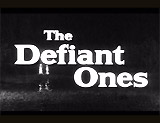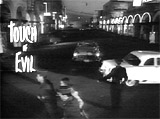
|
![]()
Greatest Films of the 1950s
1950 | 1951 | 1952 | 1953 | 1954 | 1955 | 1956 | 1957 | 1958 | 1959
Title Screen Film Genre(s), Title, Year, (Country), Length, Director, Description 

Ashes and Diamonds (1958, Poland) (aka Popiół i Diament), 103 minutes, D: Andrzej Wajda
Polish director Wajda's political post war-time drama about the theme of fate was the last film in a so-called "Underground Trilogy," coming after Pokolenie (1955, Pol.) (aka A Generation) and Kanal (1957, Pol.). It was adapted from source material - provided by Polish writer Jerzy Andrzejewski's 1948 novel with the same title. Set in 1945 in Poland (struggling to rise from the "ashes" of war with new leaders), young ex-Home Army soldiers Maciek Chełmicki (Zbigniew Cybulski, a "Polish James Dean"), Andrzej (Adam Pawlikowski) and Drewnowski (Bogumił Kobiela) were members of the anti-Communist underground Resistance movement in Nazi German-occupied Poland during World War II. At the close of the war, in the small Polish town of Ostrowiec, two of the underground soldiers-hitmen Maciek (with signature dark sunglasses) and Andrzej were ordered by Major Waga (Ignacy Machowski) to commit one final assassination - the murder of Konrad Szczuka (Wacław Zastrzeżyński), an influential political opponent and leading Communist and the local secretary of the Polish Workers' Party who had been accused of Nazi collaboration. A mixup during a planned car ambush led to the violent deaths of two innocent factory workers. The back of the coat of one individual burst into flames (one of the film's metaphors was fire) as he was gunned down, causing him to fall through a church door and reveal a statue of the Virgin Mary inside. Maciek had failed in his mission to murder the newly-appointed district secretary Commissar Szczuka. The two assassins checked into the rundown Hotel Monopol where Szczuka was to attend a large political banquet. In the hotel's bar, Maciek became flirtatious with the hotel's charming barwoman Krystyna (Ewa Krzyzewska), and after having sex with her in his room that night, they walked through the destroyed city with fresh corpses to a ruined church with an upside-down Jesus crucifix. They discussed poetry and whether there would be diamonds amongst the ashes in their shell-shocked nation now that the war was over. Their romantic time together sidetracked and weakened the youthful patriot's idealistic resolve as an assassin on a mission. Szczuka learned that his son Marek (Jerzy Jogalla) had been arrested for joining a partisan group - an underground militia. This revelation allowed Maciek to carry out his mission a second time - when Szczuka left the hotel alone at night to confer with his captured son, Maciek followed in the street and after shooting Szczuka dead, the victim clung to him. The gunshots at midnight were undetected when overshadowed by the sounds of celebratory fireworks. The next day, the struggling Maciek was faced with a crucial decision - should he remain committed to the cause that risked his life, or follow after his new love? He decided - probably unwisely - that it would be self-destructive and futile to try and build a life with the blonde barmaid Krystyna, and prepared to leave town by train. After a painful parting with the heartbroken Krystyna, Maciek - on his way to the train station - panicked when he was identified by double-crossing Drewnowski and soldiers in the Polish People's Army. He was fatally shot during flight, and died curled up in a fetal position on a garbage dump heap.

Auntie Mame (1958), 143 minutes, D: Morton DaCosta
Director Morton DaCosta's commercially-successful, Technicolored comedic drama was based on Patrick Dennis' 1955 novel of the same name about an eccentric and zesty Bohemian aunt. Best Actress-nominated Rosalind Russell portrayed the title character - a recreation of her successful 1956-1958 Broadway stage role. Her most famous line of dialogue was her life's motto: "Life is a banquet - and most poor suckers are starving to death." The film opened with the unexpected death of wealthy conservative Chicago businessman Edwin Dennis in mid-September of 1928 in Chicago, just one day after he executed his will and testament. It was stipulated that Edwin's sole heir to his estate, his 10 year-old son Patrick Dennis (Jan Handzlik as young boy), would be raised as the ward of Edwin's only living relative -- his elegantly flamboyant, ascerbic, equally-wealthy, wisecracking, free-spirited spinster sister Mame Dennis (Rosalind Russell) who resided in Manhattan in NYC at 3 Beekman Place. It was the 1920s - a time of flappers, bootleg alcohol, and bohemian lifestyles. To help protect orphaned Patrick from undue influences, his longtime Irish nanny Norah Muldoon (Connie Gilchrist) accompanied him to New York. They arrived in the midst of one of Mame's lavish parties, who was serving caviar, some pickled octopus and raw fish tails to the guests. Surprisingly, the well-mannered Patrick got along quite well with Mame, who immediately exposed him to her socialite friends and their quirky behavior, including Broadway actress Vera Charles' (Coral Browne) heavy drinking, the nudist lifestyle of Acacius Page (Henry Brandon) - the progressive headmaster of Bixby School (an experimental school in Greenwich Village where he bragged: "At my school, we wear nothing. It's heaven!"), and Mame's publisher boyfriend Lindsay Woolsey (Patric Knowles). Mame promised Patrick: "Your Auntie Mame will open doors for you. Doors you never even dreamed existed. What times we'll have!" The trustee of the will, stuffy Mr. Dwight Babcock (Fred Clark) associated with the conservative Knickerbocker Bank, was instructed to insure that the orphaned nephew of his "crazy" Aunt was protected from any of Mame's many unconventional ideas or eccentric attitudes and friends ("We must spare the boy certain influences from the wrong side of the tracks"). Babcock stated his preference to enroll Patrick in St. Boniface Academy, an exclusive boys' boarding school in Massachusetts - his own alma mater, away from Mame's daily influence; however Auntie Mame recommended the Bixby School; but after Babcock visited the school, he was flabbergasted: "There they were! A school room full of them! Boys, girls, teachers, romping around stark naked, bare as the day they were born"; he moved Patrick to St. Boniface, to restrict contact with Mame only during holidays and during the summer. Other problems arose when the stock market crashed in late 1929 and Mame lost all of her fortune ("Nothing's worth anything anymore"). Refusing to marry Lindsay in order to provide her with security, she broke off her relationship with him. Mame realized that she must settle down on her own, earn some money, and try a series of work-jobs as the "only chance to get Patrick back," including a return to the stage in a bit part, and working as a switchboard operator. During a short time as a Macy's Department store sales clerk before being fired, she met her new future husband - wealthy Southern oil baron Beauregard Jackson Pickett Burnside (Forrest Tucker) from Georgia.Mame's whirlwind romance and world-tour honeymoon with him tragically ended when he died in 1937 - he fell off a cliff on the Matterhorn while taking pictures. Patrick (Roger Smith as older), who had grown into adulthood, persuaded Mame to write her autobiography to be published by Lindsay. For some months, Mame dictated her memoirs to stenographer-secretary Agnes Gooch (Peggy Cass). Mame was also romanced by her live-in Irish fortune-hunting ghostwriter-editor Brian O'Bannion (Robin Hughes). In the meantime, Patrick unexpectedly became engaged to a Babcock-approved girlfriend named Gloria Upson (Joanna Barnes) - a spoiled, shallow, dumb-blonde with boorish, snooby, anti-Semitic parents, Claude and Doris Upson (Willard Waterman and Lee Patrick). Mame broke her date to a party with O'Bannion, to sabotage his greedy intentions by diverting his interest toward a transformed and drunken Agnes, resulting in her unexpected pregnancy and "unwed mother" relationship to O'Bannion (later, Agnes remembered that they were married). To learn more about Patrick's fiancee Gloria, Mame visited the bourgeois Upsons, who lived in a house known as "Upson Downs" in the Connecticut community of Mountebank, where she personally witnessed their abhorrent, superficial and anti-Semitic behavior, and was dismayed by their plans for her nephew Patrick. A few weeks before Patrick's wedding to Gloria, Mame invited many of the film's priincipal characters to an "intimate family dinner" party in her apartment, when the release of Mame's autobiography was to be announced and chapters of the "red-hot" galleys were distributed. Hostess Mame had specifically designed the party to make the Upsons uncomfortable, and force Patrick to cancel his wedding plans. During the awkward night, Gloria insulted Patrick by calling his acquaintances "riff-raff." Mame also insulted Gloria's parents by having Lindsay declare that her book's royalties would support a home for refugee Jewish children in Mountebank, in the Epstein's property next-door to the Upsons. When the news was blurted out, it was the ultimate straw and Mame cried out: "JACKPOT!" The family of Upsons left in a huff. Incensed and insulted with what had just happened, Babcock claimed his duty was to protect Patrick from Mame's "idiotic, cockeyed nincompoopery"; he was also dismissed by Mame for manipulating and controlling her nephew's life. Patrick - who had become recently attracted to Mame's new secretary Pegeen Ryan (Pippa Scott), broke off his engagement to Gloria. Years later in the film's epilogue in 1946, 28 year-old Patrick had married Pegeen and they had a son named Michael, who would now experience life with Mame on an exotic trip to India before his school began in the fall. She offered him the same promise given to Patrick years earlier: "I'm going to open doors for you. Doors you never even dreamed existed...."

The Big Country (1958), 166 minutes, D: William Wyler
William Wyler's spectacular widescreen, beautifully-photographed, Technicolored Western epic was based upon Donald Hamilton's originally serialized Saturday Evening Post magazine novel "Ambush at Blanco Canyon" that was published in 1958. The film opened with a memorable Saul Bass credits sequence, and Jerome Moross' sweeping and robust thematic score. Transplanted Maryland ex-sea captain James McKay (Gregory Peck) - a thoughtful, smart, and basically pacifist 'tenderfoot' arrived in the cattle town of San Rafael, TX. He was there to claim his fiancee-bride Patricia Terrill (Carroll Baker) (an only child, who had met McKay back East when she was in school); instead, he became caught up in her father's civil war feud over water rights at an adjoining ranch known as "The Big Muddy" (where a vital water source was located) - owned but no longer operated by the Maragon family. Various other main characters were introduced: patriarchal cattle-baron landowner "The Major" Henry Terrill (Charles Bickford), his main rancher-rival and reprobate Rufus Hannassey (Oscar-winning Burl Ives), Terrill's cocky and rough-hewn foreman Steve Leech (Charlton Heston), Rufus' no-good drunken son Buck (Chuck Connors), and Patricia's schoolteacher friend Julie Maragon (Jean Simmons) who had inherited "The Big Muddy" from her grandfather, but no longer operated the Maragon ranch. The highly-disciplined McKay tamed a wild bronco stallion named "Old Thunder" - to meet the challenge given to him by Terrill's foreman Steve Leech. Early on, a confrontational scene occurred over access rights to water at "The Big Muddy" between Rufus Hannassey and his rich rival enemy Major Henry Terrill, when Rufus burst into Terrill's house (during a gala party to celebrate Patricia's engagement), berated Terrill, and delivered a major ultimatum - as well as calling him a hypocrite for harrassing his wild clan of women and children. McKay made private efforts to intervene and bring peace between the Hannasseys and the McKays by offering to buy the Maragon ranch land from Julie Maragon (as a wedding present for Patricia) where "The Big Muddy" was located - to continue to keep the river free and accessible for both ranchers. Patricia separated and essentially broke up with McKay by the film's conclusion due to her disenchantment with his perceived cowardice and peace-making efforts. At the end of a marathon pre-dawn, memorable outdoor fist-fight ("not with horses or guns") without witnesses (sometimes filmed in long-shot) between non-violent McKay and the dislikeable Steve Leech, McKay ultimately questioned the futility of their fight when it ended in a draw: "Tell me Leech. What did we prove? Huh?" The film concluded with Rufus Hannassey's planned ambush of Major Terrill in Blanco Canyon, by taking Julie Maragon hostage (not knowing that she had already sold her land to McKay). There, a gentlemen's duel (with dueling pistols) was instigated between Hannassey's hot-headed son Buck and McKay - with Rufus officiating; Buck fired early (and just grazed McKay's forehead) and was reprimanded by his father - ending with cowardly Buck's death by his own honorable father when Buck unfairly stole another man's gun and was about to kill the unarmed McKay. Rufus agonized over the death of his own disreputable son: "I warned you, you dirty little...I told ya! I told ya I'd do it. I told you, but you wouldn't believe me! Damn your soul, I told you!" Another final stalking and deadly showdown occurred in Blanco Canyon between the two sole warlord protagonists: Terrill and Hannassey. It ended with both unyielding men squaring off against each other and killing each other with rifles - one lying on top of the other (filmed from a high-angle long shot). This brought peace after the violent confrontation between the two families that eliminated the two old-men protagonists; McKay rode off with Julie to start their new life together.


Cairo Station (1958, Egypt) (aka The Iron Gate, or Bab el Hadid), 77 minutes, D: Youssef Chahine



Cat on a Hot Tin Roof (1958), 108 minutes, D: Richard Brooks


The Defiant Ones (1958), 97 minutes, D: Stanley Kramer
Liberal director-filmmaker Stanley Kramer, well-known for directing heavy-handed, social issues dramas (such as Inherit the Wind (1960) and Guess Who's Coming to Dinner (1967)), helmed this social commentary film about racism. The film had 9 Academy Award nominations including Best Picture, Best Director, Best Actor (Tony Curtis), Best Actor (Sidney Poitier), Best Supporting Actor (Theodore Bikel), Best Supporting Actress (Cara Williams), and Best Film Editing, and won two Oscars: Best B/W Cinematography and Best Writing, Story and Screenplay - Written Directly for the Screen (Nedrick Young and Harold Jacob Smith). Two chain-gang convicts in the 1950s South - bigoted white Southerner John "Joker" Jackson (Tony Curtis) (convicted of armed robbery) and black Noah Cullen (Sidney Poitier, the first black actor to star in mainstream Hollywood films in non-stereotyped roles) (incarcerated for assault and battery) were shackled together. When they escaped from an overturned transport truck during a rainstorm, they had to cooperate with each other and put aside their racial animosities as they evaded the oppressive search of the police. Held together by a 29 inch steel chain, they were manacled to each other, and only bound by their will and determination to escape. Their pursuit was headed up by a local "humanitarian" - the liberal and compassionate Sheriff Max Muller (Theodore Bikel), with other more redneck state troopers and police officers with vicious tracking dogs. Although captured at Jackson's former place of work (a turpentine camp 60 miles to the north), they were confronted by Mack (Claude Akins) and a threatening lynch mob, although Big Sam (Lon Chaney, Jr.) stepped in and halted the bloodthirsty injustice, and then released the two to escape in the middle of the night. At an isolated farm house, they were cared for by needy, lonesome, abandoned and love-starved single mother (Cara Williams). Her devious plan to send Cullen off into the swamp while she ran off with Jackson to the city backfired when she betrayed his trust. Jackson chased after Cullen and told him: "That woman told you wrong." The film's classic image was of their clapsed white and black hands of the two desperately trying to help each other board a speeding train - Cullen reached back to pull Jackson up, but couldn't save him ("I can't make it! I can't make it!") and sacrificed his own freedom by jumping off. In the conclusion, Cullen defiantly sang the blues song "Long Gone" - with the wounded Jackson lying in his arms, before the two were apprehended by Sheriff Muller.



Elevator to the Gallows (1958, Fr.) (aka Ascenseur Pour l'échafaud), 88 minutes, D: Louis Malle


Gigi (1958), 115 minutes, D: Vincente Minnelli



Horror of Dracula (1958, UK), 82 minutes, D: Terence Fisher



I Want to Live! (1958), 120 minutes, D: Robert Wise
Director Robert Wise's film-noirish, low-budget, gritty biographical (yet heavily fictionalized) crime drama (with an original rhythmic jazzy score) was a clear indictment of capital punishment. The screenplay was based on magazine and newspaper articles, court transcripts, and personal letters from the imprisoned and condemned defendant. Non-violent petty criminal (burglary, forgery, perjury), prostitute ("party girl"), and drug addict Barbara Graham (Academy-Award winning Susan Hayward) was also associated with West Coast low-life, underworld figures in San Francisco's Tenderloin area. The street-wise seemingly tough female acted as a "shill" - bringing in unsuspecting men to be fleeced at a gambling parlor. Graham was charged by a grand jury with the brutal murder of crippled, 64 year-old widow Mrs. Mabel Monahan during a robbery attempt in her Burbank, CA home in March of 1953, along with three known criminal accomplices: Emmett Perkins (Philip Coolidge), John R. 'Jack' Santo (Lou Krugman), and Bruce King (James Philbrook). Reportedly, the murder victim had $100,000 hidden somewhere in her home, but wouldn't divulge where. Underground figure King was apprehended at the scene, turned state's evidence, and ratted on the location of Graham and her petty associates in Lynwood, CA. The three suspected murderers were now in custody. Although Graham was questioned thoroughly, she defiantly claimed her innocence, but her sordid past would cause her to be regarded as guilty from the start (without presumption of innocence). For the trial, she was defended by attorney Richard Tibrow (Gage Clarke). During the trial, suspect King had been granted immunity, and claimed that Graham was a partner in the crime (she was nicknamed "Bloody Babs"). She had no solid or credible alibi - it couldn't be proved that she was home with her shifty, drug-addicted bartender-husband Henry/Hank Graham (Wesley Lau) and young child on the evening of the crime. Wired undercover police detective Ben Miranda (Peter Breck) entrapped the desperate and anxious Graham (fearing the death penalty) into confessing, when she was falsely promised an alibi. She was convicted of the crime in 1954, and sentenced to death. During the torturously-long appeals process, she was represented by San Francisco reporter-newspaperman Ed Montgomery (Simon Oakland), and defended by psychologist Carl Palmberg (Theodore Bikel), who claimed she was anti-social, but not violent. Her loyal friend Peg (Virginia Vincent) also testified on Barbara's behalf. However, her verdict could not be overturned ultimately, and she was not able to obtain clemency from the governor. After a few last-minute stays of execution were exhausted, 31 year-old Graham - who still claimed she was innocent, was sent to San Quentin's gas chamber in the late-morning of June 3, 1955. The death scene was memorable. When strapping her in a chair, preparing the sulphuric acid chemicals (and cyanide pellets), and masking her, the prison guard added: "When you hear the pellets drop, count ten. Take a deep breath. It's easier that way." Graham quipped: "How do you know?"


Man of the West (1958), 100 minutes, D: Anthony Mann

Mon Oncle (1958, Fr.) (aka My Uncle), 117 minutes, D: Jacques Tati


The Old Man and the Sea (1958), 86 minutes, D: John Sturges
Director John Sturges' adventure-drama was an adaptation of Ernest Hemingway's short 1952 novel about a fisherman off the coast of Cuba who heroically struggled with a hooked marlin bigger than his boat. The opening voice-over narration told about the old Cuban fisherman/Narrator - Santiago (Spencer Tracy) - and his friendship with young boy Manolin (Felipe Pazos, Jr.), who was taught how to fish, but was forbidden to accompany the old man fishing because it was considered bad luck. After 84 days of fishing, the old Santiago was unable to catch any fish. When he was ashore, the young Manolin idolized Santiago - and Santiago often turned to young Manolin for social and physical support; one of their topics of discussion was baseball (from newspaper reports), specifically the Yankees and Santiago's idol - player Joe DiMaggio. Santiago experienced night-time dreams of his younger days, when he was in Africa and lively lion cubs played on the beach-shore. In another instance, he dreamed about a marathon contest of two days of arm-wrestling with a strong black dockworker (Don Blackman) in a Casablanca tavern. On his 85th day of fishing, the old, frail and often solitary and lonely fisherman finally hooked a giant marlin on his line. Aver a period of three days and nights during his agonizing struggle with the creature, he tried to land the huge monstrous creature as the great fish towed his skiff way out to sea. In the heat of the day from the blazing sun in the Gulf Stream of the Atlantic, the old man began to suffer fatigue and bloody arthritic hands from the fishline - in his contest of wills. He marveled at the fish's size and ability, and the sleepless Santiago was finally able to kill the marlin by harpooning his prey next to his skiff - and then apologized to it. A group of hungry mako sharks nibbled at the carcass of the marlin lashed to the side of his boat, and mutilated it - Santiago was helpless to gallantly defend his prized fish against the overwhelming number of sharks. By the time he reached the dock with his catch, nothing was left but skeletal remains - but it still provided proof of his triumphant struggle against nature. As tourists from Havana at a cafe marveled at the skeleton, Santiago was back in his shack, "dreaming about the lions."

Separate Tables (1958), 100 minutes, D: Delbert Mann


Some Came Running (1958), 137 minutes, D: Vincente Minnelli




Touch of Evil (1958), 95 minutes, D: Orson Welles
The themes of director/actor Orson Welles' off-beat, twisted, dark and sweaty, film noirish mystery-thriller (considered the last official film noir) were murder, police corruption, kidnapping, betrayal, perversion and more. The film's celebrated credits-opening - with a captivating continuous-action, spectacular 3-minute and 30 second tracking and panning crane shot - followed a convertible (after a timed explosive dynamite device had been placed in its trunk when it was parked in Mexico), as it crossed the US/Mexico border into the squalid Mexican-American border town of Los Robles (TX). The car was driven by wealthy local American businessman involved in construction - Rudy Linnekar (Jeffrey Green) who was with his blonde mistress-girlfriend Zita (Joi Lansing), a striptease dancer. The car's route was intertwined with views of a newly-married couple: self-righteous Mexico City narcotics investigator Ramon Miguel "Mike" Vargas (Charlton Heston) and his blonde American bride Susan (Janet Leigh) walking to the border crossing. As the inter-racial newlyweds kissed, the sound of the sudden and violent explosion of the detonated car overlapped on the soundtrack, and they turned their faces toward the blast. At a low-angled shot, a grotesque, cigar-smoking, candy-chewing, obese and bloated local detective Hank Quinlan (Orson Welles) first appeared as he rolled out of his car at the scene of the car bombing. As a narcotics commission expert, Vargas became snarled in the local investigation with the racist Quinlan, at the behest of Quinlan's loyal partner Police Sgt. Pete Menzies (Joseph Calleia), and DA Adair (Ray Collins). Vargas in particular suspected that the local Grandi narcotics ring, run by local crime boss Uncle Joe Grandi (Akim Tamiroff), was somehow involved. Meanwhile, Vargas entirely ignored his young honeymooning bride; in a continuing series of sexual terrorization, she was first harrassed in Grandi's sleazy, dark motel in town by a peeping tom with a flashlight that shone on her as she removed her cashmere sweater. Grandi was interested in intimidating Susan to pressure her to have her husband end his prosecution of Grandi's drug-dealing brother who was imprisoned and awaiting trial in Mexico. While Quinlan was on the Mexican side of the border during the case, he visited with cigar-smoking, Mexican gypsy and brothel manager Tanya (Marlene Dietrich in a memorable cameo), a former lover and femme fatale; she engaged in verbal foreplay with Quinlan: (To Quinlan: "I didn't recognize you. You should lay off those candy bars....You're a mess, honey"). Then, while Susan was sequestered in a room of a deserted, out-of-the-way and remote motel on the outskirts of the Texas town (not knowing it was owned by Grandi), she was attacked by menacing thugs (also members of the Grandi gang), and had to endure the care of the weirdo, nervous and twitchy motel manager/night watchman (Dennis Weaver). During this and many other past investigations, the experienced, old-time cop Quinlan habitually fabricated or planted evidence to convict the guilty (even though his instincts were usually correct and he had a perfect arrest record). He framed young Mexican shoe clerk Sanchez (Victor Millan) who had secretly married Marcia (Joanna Moore), Linnekar's daughter. Quinlan had surreptitiously placed two sticks of dynamite in a shoe box in Sanchez' apartment - in a long and second unedited sequence. (Vargas knew of the deception, putting him into conflict with Quinlan.) Behind the scenes, Grandi plotted with Quinlan to destroy Vargas professionally and personally by framing Susan for drug use. At the motel, Susan was shot up with drugs and then brought back to a room in Grandi's downtown hotel, to appear like she had experienced a drug overdose. In addition, Quinlan had chillingly strangled Uncle Joe Grandi to death in the hotel room next to a semi-unconscious Susan, in an attempt to frame Susan for his murder - and she was arrested. As the film wound to its climactic conclusion, Sgt. Menzies revealed to Vargas that Quinlan was implicated when his cane was found at Grandi's murder scene, and he agreed to wear a wire to try and entrap his partner. In the gripping climax, Quinlan began to confess his wrong-doings - but then realized that Menzies was betraying him and recording him. He heard the echo of his own voice as it was recorded on a transmitter held by Vargas under a bridge, and realized he had been taped and everything about the frame-up had been revealed by his partner Sgt. Pete Menzes. Quinlan angrily shot Menzies and lethally wounded him. To protect the unarmed Vargas from also being shot by Quinlan, Menzies shot Quinlan before dying. The corrupt police captain was finally brought down. The final image was of Quinlan lying dead and floating whale-like in dark and stagnant gutter-canal water and garbage. Vargas was informed that Sanchez had confessed to the crime, and was reunited with Susie. Tanya arrived to deliver Quinlan's epitaph in the film's final line: "He was some kind of a man. What does it matter what you say about people?...Adios!"


Vertigo (1958), 128 minutes, D: Alfred Hitchcock
Director Alfred Hitchcock's perplexing, necrophiliac-tinged thriller about obsession was arguably his most complex, and most analyzed compelling masterpiece. It involved a man's compulsive obsession to exploitatively manipulate and transform a woman to match his fantasy. The dazzling credits sequence, with Bernard Herrmann's score, visualized a fragmented and shifting image of a woman's blank and expressionless face, followed by a close-up view of her eye as the film's title "Vertigo" zoomed out slowly from the depths of her widening pupil with spiraling, vertiginous, animated designs. In the film's opening chase sequence, plain-clothes SF police detective (later identified as John "Scottie" Ferguson (James Stewart)) and a uniformed SF policeman (Fred Graham) were pursuing a criminal-fugitive. Scottie was left hanging from a gutter - frozen by his debilitating fear of heights (acrophobia). He also suffered from 'vertigo' as he watched in horror as his fellow officer tried to assist him and fell to his death. The detective was forced to retire, and was helped to recover with his longtime friend and ex-fiancee, Marjorie "Midge" Wood (Barbara Bel Geddes), an artist (and fashion illustrator) who was in unrequited love with him. Scottie found himself hired by his old college friend, Gavin Elster (Tom Helmore), to trail his potentially-suicidal wife as she wandered around San Francisco. His first view of the female - a cool, ethereal, lovely and elegant blonde named Madeleine (Kim Novak), occurred in Ernie's Restaurant. Scottie continued to stalk after Madeleine, and followed her into the art gallery at the California Palace of the Legion of Honor where he found her hypnotized, motionless and trance-like in front of a portrait painting of a woman named Carlotta Valdes, her ancestor's portrait. Madeleine's obsession with her tragic ancestor Carlotta Valdez intrigued Scottie. Scottie rescued the suicidal Madeleine at the Golden Gate Bridge, when she tore and threw flower petals from her Carlotta-like nosegay into the water, and then jumped into the cold waters of the Bay. He soon became entranced and bewitched by her, and fell in love with her. During a visit together at San Juan Bautista's Spanish Mission about 100 miles south of San Francisco, Scottie hoped that visiting the real-world California mission would end Madeleine's nightmares and cure her fears. She ran toward the mission's church and bell tower, climbed up the bell tower's crude, winding and rickety wooden staircase - with Scottie in pursuit, although he was slowed by his acrophobia and vertigo. At the top, she fell to her death from the tower in an assumed suicide, and Scottie spiraled down into a deep depression. Haunted and obsessed with the dead woman, he happened to meet her lower-class double Judy (Novak again), a shop-girl. Scottie manipulated, reshaped and remade her into the dead Madeleine's image. But then came a striking moment when Scottie was attaching a necklace around Judy's neck, and he realized that Judy was Madeleine (imagined in a momentary flashback of the necklace in the portrait and Madeleine gazing at it from a museum bench) -- he suddenly knew there was no Madeleine, and that he had been tricked by Elster. They traveled again to the mission, where Scottie asked agonizing questions as he dragged Judy into the mission and up the stairs of the mission tower during their second visit, to recreate the death scene. There was another terrifying sequence in the bell tower, when she sincerely professed that she still loved him even though he had been her victim. Footsteps of a black-clad figure in the shadows startled Judy - she recoiled, stepped and fell backwards through an opening in the tower and plummeted to her own death (off-screen) in an emotionally-shattering climax. The figure was a nun from the mission, who crossed herself and murmured the last words of the film: "God have mercy." In the uncompromising conclusion, a stunned Scottie stood on the belfry tower ledge as he stared down at Judy's dead body in the tragic ending - Scottie had tragically loved and lost the same woman twice.